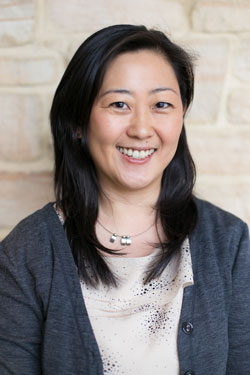
Reina Maruyama, assistant professor in the Department of Physics and faculty member at the Wisconsin IceCube Particle Astrophysics Center (WIPAC), has been named Woman Physicist of the Month by the American Physical Society. The award was designed to honor women who have positively impacted the lives and careers of others.
“I think supporting students and postdocs is a part of being in the physics community,” says Maruyama. “I received and continue to receive support from the people who came before me, and continuing to help young people develop is part of the package.”
Maruyama, recipient of a 2012 National Science Foundation CAREER Award, studies nuclear and particle astrophysics with emphasis on dark matter, supernovae, and neutrinoless double beta decay. She is the spokesperson for DM-Ice, a dark matter detector at the South Pole, and works on the IceCube Neutrino Observatory and CUORE, the Cryogenic Underground Observatory for Rare Events.
Francis Halzen, UW–Madison physics professor and interim director of WIPAC, remarked, “This puts Reina in the company of a very distinguished group of physicists and it did not come as a surprise—it is well deserved.”
In addition to her research and teaching responsibilities, Maruyama participates in public education events and actively mentors postdocs and grad students.
This July, Maruyama will leave UW–Madison and WIPAC to join the physics department at Yale University. Although she will be missed at the research center, her involvement with IceCube will continue and WIPAC staff and scientists will still work on DM-Ice.
“I look forward to continue working on DM-Ice with the fantastic physicists and engineers from WIPAC. Engineers from the UW–Madison Physical Science Laboratory are integral to making the instrumentation a success,” she explains. “I enjoyed the supportive atmosphere of WIPAC, and to be involved in IceCube construction was incredibly exciting. There are a lot of talented, driven, and capable people here.”
In 2010, Maruyama recorded a video at the South Pole while testing instrumentation for the IceCube Neutrino Observatory. In the clip below, she explains her work for the season and why IceCube is important for the future of particle physics.
Reina Maruyama, assistant professor in the Department of Physics and faculty member at the Wisconsin IceCube Particle Astrophysics Center (WIPAC), has been named Woman by the American Physical Society. The award was designed to honor women who have positively impacted the lives and careers of others.
“I think supporting students and postdocs is a part of being in the physics community,” says Maruyama. “I received and continue to receive support from the people who came before me, and continuing to help young people develop is part of the package.”
Maruyama, recipient of a 2012 National Science Foundation CAREER Award, studies nuclear and particle astrophysics with emphasis on dark matter, supernovae, and neutrinoless double beta decay. She is the spokesperson for DM-Ice, a dark matter detector at the South Pole, and works on the IceCube Neutrino Observatory and CUORE, the Cryogenic Underground Observatory for Rare Events.
Francis Halzen, UW–Madison physics professor and interim director of WIPAC, remarked, “This puts Reina in the company of a very distinguished group of physicists and it did not come as a surprise—it is well deserved.”
In addition to her research and teaching responsibilities, Maruyama participates in public education events and actively mentors postdocs and grad students.
This July, Maruyama will leave UW–Madison and WIPAC to join the physics department at Yale University. Although she will be missed at the research center, her involvement with IceCube will continue and WIPAC staff and scientists will still work on DM-Ice.
“I look forward to continue working on DM-Ice with the fantastic physicists and engineers from WIPAC. Engineers from the UW–Madison Physical Science Laboratory are integral to making the instrumentation a success,” she explains. “I enjoyed the supportive atmosphere of WIPAC, and to be involved in IceCube construction was incredibly exciting. There are a lot of talented, driven, and capable people here.”
In 2010, Maruyama recorded a video at the South Pole while testing instrumentation for the IceCube Neutrino Observatory. In the clip below, she explains her work for the season and why IceCube is important for the future of particle physics.
